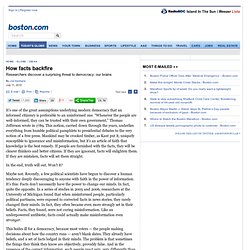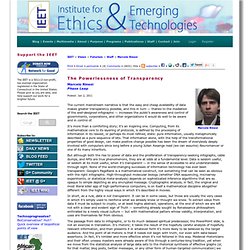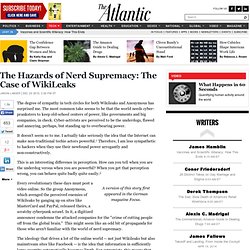

How facts backfire. It’s one of the great assumptions underlying modern democracy that an informed citizenry is preferable to an uninformed one.

“Whenever the people are well-informed, they can be trusted with their own government,” Thomas Jefferson wrote in 1789. This notion, carried down through the years, underlies everything from humble political pamphlets to presidential debates to the very notion of a free press. Mankind may be crooked timber, as Kant put it, uniquely susceptible to ignorance and misinformation, but it’s an article of faith that knowledge is the best remedy. If people are furnished with the facts, they will be clearer thinkers and better citizens. If they are ignorant, facts will enlighten them. In the end, truth will out. Maybe not. This bodes ill for a democracy, because most voters — the people making decisions about how the country runs — aren’t blank slates. “Area Man Passionate Defender Of What He Imagines Constitution To Be,” read a recent Onion headline.
What’s going on? The Powerlessness of Transparency. The current mainstream narrative is that the easy and cheap availability of data makes greater transparency possible, and this in turn — thanks to the mediation of the well-designed infographic — increases the public’s awareness and control of governments, corporations, and other organizations it would do well to be aware and in control of.

It’s more than a comforting story; it’s an inspiring one. Computing, from its mathematical core to its layering of protocols, is defined by the processing of information in its rawest, or perhaps its most refined, state: pure information, usually metaphorically described as a pure sequence of bits. That information alone, with the help of the transformational properties of good design, can make positive change possible has been the dream of everybody deeply involved with computers since long before a young Julian Assange read (we can assume) Neuromancer or one of its many inheritors. In short, as a rule, data is not transparent. Design Without Designers. Posted by Don Norman | 7 Oct 2010 | Comments (33) I will always remember my first introduction to the power of good product design.

I was newly arrived at Apple, still learning the ways of business, when I was visited by a member of Apple's Industrial Design team. He showed me a foam mockup of a proposed product. "Wow," I said, "I want one! What is it? " That experience brought home the power of design: I was excited and enthusiastic even before I knew what it was. Don't believe me? The Hazards of Nerd Supremacy: The Case of WikiLeaks - Jaron Lanier - Technology. The degree of sympathy in tech circles for both Wikileaks and Anonymous has surprised me.

The most common take seems to be that the world needs cyber-pranksters to keep old-school centers of power, like governments and big companies, in check. Cyber-activists are perceived to be the underdogs, flawed and annoying, perhaps, but standing up to overbearing power. It doesn't seem so to me. I actually take seriously the idea that the Internet can make non-traditional techie actors powerful.1 Therefore, I am less sympathetic to hackers when they use their newfound power arrogantly and non-constructively.
This is an interesting difference in perception. A version of this story first appeared in the German magazine Focus. Every revolutionary these days must post a video online. The ideology that drives a lot of the online world -- not just Wikileaks but also mainstream sites like Facebook -- is the idea that information in sufficiently large quantity automatically becomes Truth.